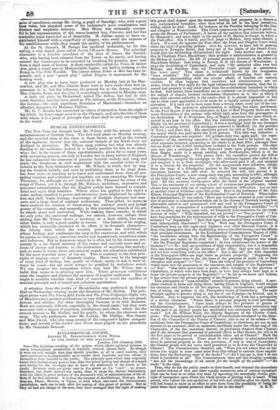MUSICAL ENTERTAINMENTS.
The New Year has brought back Mr. Wilson with his annual series of entertainments of Scottish Song. The first took place on Monday evening;
and the crowded state of the room in Store Street, as well as the warmth of the applause, showed that the national ballads of the North have not declined in attraction. Mr. Wilson sang nothing but what was already familiar to the audience: indeed it is hardly possible for him to do other- wise; for, in the course of these entertainments, given for so many years, with unvarying success, not only in London but in every corner of England, he has exhausted the treasures of genuine Scottish melody and song, and made the Southrons as well acquainted with the musical riches of Ca- ledonia as the Scots themselves are. Mr. Wilson, in truth, first by sing- ing the Scottish ballads, and next by publishing them as he sings them, has done more, in teaching us to know and understand them, than all pre- ceding vocalists and collectors put together, not even excepting Mr. George Thomson; for, although we are indebted to Mr. Thomson for many of the Songs of' Burns, yet it is through Mr. Wilson's melodious, expressive, and animated interpretation, that the English public have learned to compre- hend and enjoy their beauties. Wilson alone has applied to this object a voice seldom equalled in power and sweetness, taste heightened by cultiva- tion and skill, warm feelings, knowledge of Scottish character and man- ners, and a large fund of national enthusiasm. Thus gifted, he seems to have received the mission of illustrating the national music and lyrical poetry of his country; and assuredly, in this interesting branch of his art, he stands alone and unrivalled. While making these remarks, in which we only echo the universal suffrage, we cannot, however, refrain from adding, that Mr. Wilson shows a tendency to a fault which, like many other faults, is only a good quality in excess. One feature of his singing, which has eminently conduced to its effect, is its dramatic character— the felicity with which the vocalist personates the individual of whose feelings and sentiments the song is the expression, and with which he carries on dialogues, sometimes tender and impassioned, sometimes comic and ludicrous. But in humorous songs he is often led by his dramatic pro- pensity to a too literal mimicry of the coarse and uncouth tones and ac- cents of clowns and dotards, to the destruction of anything like melody; and, to make it worse, these anti-musical sounds are sometimes substituted for the most essential notes of' the air. This is contrary to the first prin- ciples of singing—even of dramatic singing. Music may be the language of every kind of feeling; but, gentle or violent, merry or sad, it must al- ways be music—the ear must always be gratified by melodious sound. We can imagine the temptation which may lead Mr. Wilson into a habit that seems to be growing upon him. These grotesque exhibitions raise the laughter and produce the applause of popular audiences. But he ought to consider whether that kind of success is worth the sacrifice of musical principle and of sound and judicious approbation.


























 Previous page
Previous page